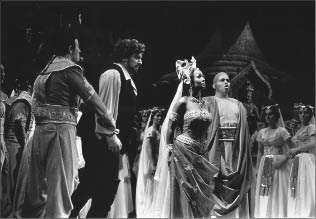The Unkindest
cut of All, Part II

In the prologue of Richard Strauss’s Ariadne auf Naxos we find a bunch of performers arguing about who is more important — who gets to go on and who gets cut. It was a case of life imitating art when the exact same thing happened during a production of Giacomo Meyerbeer’s L’Africaine that I directed at San Francisco Opera in 1972.
The cast included Plácido Domingo, who was singing the role of Vasco da Gama for the first time, Shirley Verrett as Selika, and Norman Mittelmann as Nelusko. It was a lavish production — one that took a lot of work to bring to the stage. We had no sooner finished the final dress rehearsal than General Director Kurt Herbert Adler ordered me to shorten the production by twenty minutes. Mind you, this was after the final dress rehearsal! Talk about an unreal demand! But Adler was unflinching. His wasn’t an artistic consideration. L’Africaine is a sprawling five-act grand opera and, ever mindful of costs, he was concerned that the performance might run past midnight. Under the rules of most union contracts, even to this day, overtime compensation kicks in after midnight.
I eliminated as much of the ballet as I could get away with, but still came up short. Stupidly I called the principal artists together and asked them for suggestions as to what we could cut. Immediately Verrett and Mittelmann started in on each other. “I don’t see why Norman’s scene

Plácido Domingo and Shirley Verrett in L’Africaine, 1972.
Photo by Ken Howard.
has to be so long,” Shirley would say, only to have Norman counter, “Shirley has so many arias, are you telling me that anyone is going to miss one of them?”
“Why does Norman have to be in my death scene,” Shirley shot back, implying a cut that would have saved all of thirty seconds.
As these two went at it, Plácido stood by quietly. Finally he said, “Look, Lotfi, why don’t you cut ‘O paradis,’” referring to his own aria, the single most famous moment in the whole opera. “Whatever you decide is OK with me.” With that, he left. This incredibly generous gesture shut up everyone. I decided the cuts myself, and Adler got his twenty-minute reduction.
To add insult to injury, though, on opening night the curtain was delayed because of a bomb threat. The length of the delay was exactly twenty minutes.
Aghast at even the prospect of going past midnight, Adler “encouraged” conductor Jean Périsson to keep things moving. The principal artists, of course, could not be unreasonably rushed. But I would bet that never in the history of opera have the choruses of L’Africaine ever been sung so fast. Thanks to this and a few other shortcuts, the final curtain came in at just before midnight.
We weren’t out of the woods yet. There were still the bows, which count as part of the length of a performance. Usually Adler wanted curtain calls to go on for as long as possible. In fact, his signature move was to stand in the wings and shake the curtain to milk applause from the audience. On this night, however, he got them done in record time. “Norman, GO GO GO GO. BACK BACK BACK,” Adler yelled. “Plácido, GO GO GO GO. BACK BACK BACK. Shirley, GO GO GO GO. BACK BACK BACK.” At a breakneck pace, the principal artists were trotted a few feet onto the stage and then immediately yanked back, with barely enough time to acknowledge the audience. It looked for all the world like an old vaudeville routine where performers are pulled offstage by a giant hook.